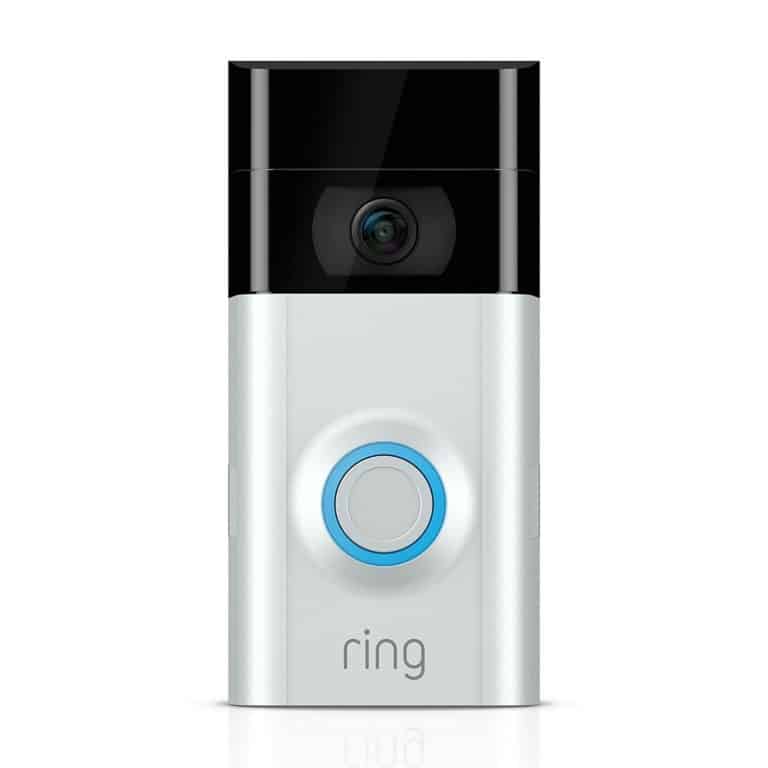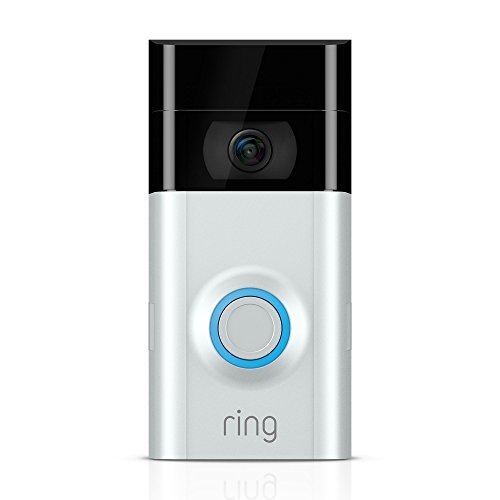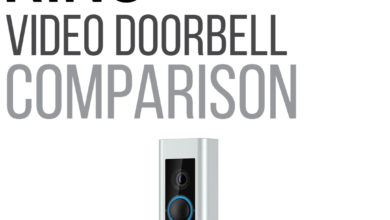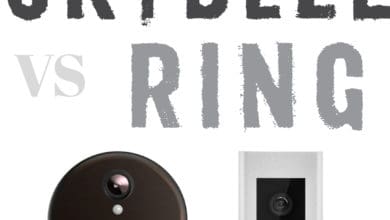Ring 2 vs Ring 3 vs Ring 3 Plus: What’s Changed?
Rings latest Doorbell 3 and its companion 3 Plus has come several years after the second generation model. After a long wait, you may be wondering what are the upgrades and why is there also a 3 Plus model. This article will take you through exactly how the newer models have tweaks and improvements on the previous Ring 2. Comparing the Ring 2 vs Ring 3 vs Ring 3 Plus, we will provide the right information so you can decide whether the extra money of the newer model is worth it in addition to the value of going with the 3 Plus.
Related:
Contents
Comparison Chart
| Model | Ring 2 | Ring 3 | Ring 3 Plus |
|---|---|---|---|
| Design | 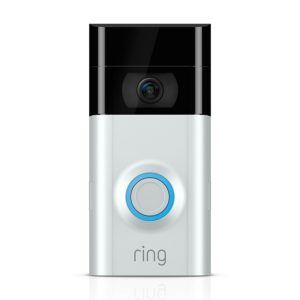 | ||
| Motion Detection | 5 Selectable Zones | Adjustable Zones | Adjustable Zones |
| Camera | 160° FOV Live View Night Vision 1080p | 160° FOV Live View Night Vision 1080p | 160° FOV Live View Night Vision 1080p |
| Two Way Talk | ✔ | ✔ | ✔ |
| Pre-Roll | ✔ | ||
| Power | Hardwired or Battery | Hardwired or Battery | Hardwired or Battery |
| WiFi Connectivity | 2.4 Ghz | 2.4 Ghz 5 Ghz | 2.4 Ghz 5 Ghz |
| Bottom Line | Recommended Budget Option | Solid Features | Recommended Pick |
| Availability | Check Price | Check Price | Check Price |
Related: Complete Ring Doorbell Series Comparison
Ring 2
The Ring Doorbell 2 is one of the most popular from the company and may in fact be their highest selling. It is fair to say that this doorbell gets all the basics right and allows for some flexibility for the user. For example, the 1080p HD resolution and a160° field of view is the same as any other Ring doorbell, even the newer and more advanced models. Additionally, there is the Live View and Two-Way Audio that is enabled through the speaker and microphone of the Ring 2, which allows the front door to be answered remotely.
There is some flexibility for the Ring 2 as it can be powered through battery or wiring. Each of these have their own benefits, but wireless tends to be the favorite as the setup and installation is much simpler. There is also some freedom with activity zone settings, which are areas of the camera view that can be turned on or off to ignore motion detection. This helps fine-tune where the doorbell needs to look out for motion detection whilst preventing false alerts.
- 1080p HD video doorbell that lets you see, hear and...
- Get notifications whenever motion is detected by...
- With Live View, you can check in on your home any time...
Ring 3 & Ring 3 Plus
The Ring 3 and its counterpart, the 3 Plus, are two of the latest additions to the Ring doorbell series. Although released many years after the Ring 2, these doorbells provide a slight upgrade. The basic camera features are no different; 1080p and 160° field of view. Just like the Ring 2, the Ring 3 and 3 Plus have flexibility with their power supply, either going wireless or wired.
However, there have been some improvements with the wireless connectivity and motion detection customization. Whilst the Ring 2 just operated on a 2.4 GHz network, the Ring 3 models also work with 5 GHz. For those who don’t know, 5 GHz is much faster at shorter distances, which will improve the responsiveness of the doorbell. The whole operation of using the Ring 3 on 5 GHz is much smoother and snappier than the using the Ring 2 on 2.4 GHz.
The Ring 3 activity zones are preset areas on the camera view, except they can be adjusted and moved around. This isn’t as customizable as the Ring Pro or Elite, but it is certainly an improvement. There are also near motion zones that go from 5 to 15 feet, whilst the Ring 2 is just 15 to 30 feet.
Finally, a big difference between these models is that the Ring 3 Plus has a Pre-roll feature. This captures four seconds of footage before motion triggers the doorbell to record. The Ring 3 Plus is the first wireless doorbell that has this feature.
- 1080p HD video doorbell that lets you see, hear and...
- Get notifications whenever motion is detected by...
- With Live View, you can check in on your home any time...
Also worth a read: Ring vs Skybell
Differences of Ring 2, Ring 3 & 3 Plus
Although we have covered the main differences in our overview section, we will provide you with a useful summary of each of them.
WiFi Network
The Ring 3 and 3 Plus work with both 2.4 GHz and 5 GHz WiFi networks. With less flexibility in this area, the Ring 2 is just compatible with 2.4GHz. Anyone using a 5 GHz WiFi network will have a speedier and better performance of the doorbell, as the data transfer is quicker. This isn’t essential, but rather just a nice perk.
Motion Detection
There are two differences with the motion detection capabilities of the Ring 3 and 3 Plus compared to the Ring 2. First is that the zones of the Ring 3, although preset, can be adjusted. This means the user can manually move them around to suit their front doors view and ignore unnecessary alerts. The Ring 2 has preset areas that can simply be turned on or off, without andy adjustment.
The Ring 3 versions also near motion detection which works in the closest area to the doorbell. This is between 5 and 15 feet, in addition to the 15 to 30 feet zone. The older Ring 2 is limited to the 15 to 30 feet zone.
Pre-Roll
The Ring 3 Plus has a Pre-roll feature that neither the Ring 2 or Ring 3 has. This records the four seconds before the motion detector is triggered and footage is recorded. Pre-roll allows more footage to be gathered which may reveal something that would otherwise go unnoticed by the homeowner.
Similarities of Ring 2, Ring 3 & 3 Plus
From our differences section, it is pretty clear that there isn’t a world of difference between these video doorbells. There have much more in common than what sets them apart.
Resolution and Field of View
The most important camera features of video doorbells are the resolution and field of view of the camera. This defines exactly what the camera portion of the device sees and what quality it is. The Ring 2, 3 and 3 Plus all have a 160°field of view and 1080p resolution
Video Doorbell Features
Two of the most fundamental features that turn the camera into a video doorbell late live view and two-way talk. Through the app, the user can view the live camera feed and talk to whoever is there. This is a staple feature so it goes without saying that the Ring 2 and each Ring 3 version has these features.
Wireless or Wired
The Ring 2, Ring 3 and 3 Plus all have the flexibility to operate wirelessly through batteries or wired with a connection to the electricity mains. Each has its own benefits, such as wireless being easier to set up or wired not requiring battery recharging every few months.
Ring Protect
Regardless of which doorbell you go for, if you wish to be able to record and view footage from the device, you will have to pay for Ring Protect membership. There are two levels; Basic and Plus. Ring Protect Basic is $3 a month or $30 a year and covers one Ring device, providing 30 to 60 days of cloud storage. Ring Protect Plus is $10 a month or $100 a year and covers multiple Ring devices. The cloud storage length is the same but there are a couple of extra benefits such as a 10% discount off Ring products and professional monitoring for the Ring alarm should you buy one.
Whilst a Ring Protect device isn’t necessary for the device to work, it si highly recommended as having footage stored on the cloud that can be retrieved is useful as evidence should something go wrong. If you opt to not get Ring Protect then you can still access the benefits of answering the door remotely and talking with whoever is there.
Final Word
The Ring 3 is a marginal upgrade from the Ring 2, but the Ring 3 Plus is a much larger one. Pre-roll as an added feature makes the device much useful and given the similar prices of the Ring 3 and 3 Plus, we would highly recommend going for the 3 Plus. However, if your budget is more constrained than the Ring 2 will do just fine. Given that it is around half the price of the Ring 3, you do make a solid saving going for an older generation. The basics are all done right, like the resolution and field of view along with the perks of the app and Ring Protect program should you pay for it.
